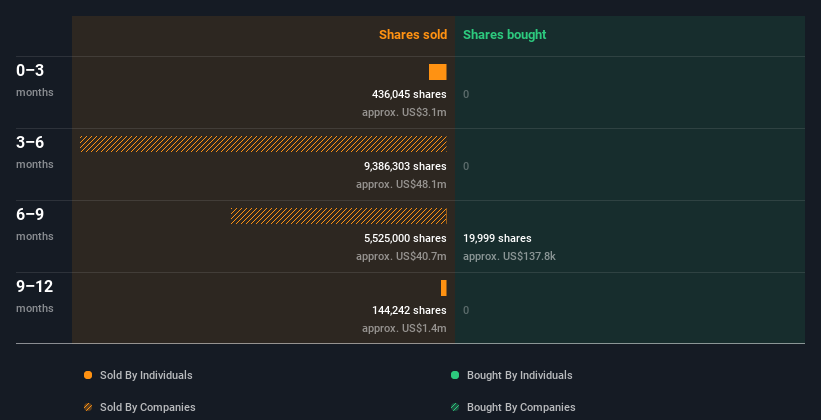- United States
- /
- Consumer Durables
- /
- NasdaqGS:CRCT
Insider Sellers Might Regret Selling Cricut Shares at a Lower Price Than Current Market Value

Despite the fact that Cricut, Inc.'s (NASDAQ:CRCT) value has dropped 11% in the last week insiders who sold US$4.7m worth of stock in the past 12 months have had less success. Insiders would probably have been better off holding on to their shares given that the average selling price of US$7.80 is still lower than the current share price.
Although we don't think shareholders should simply follow insider transactions, we do think it is perfectly logical to keep tabs on what insiders are doing.
Check out our latest analysis for Cricut
Cricut Insider Transactions Over The Last Year
Over the last year, we can see that the biggest insider sale was by the CEO, President & Director, Ashish Arora, for US$1.9m worth of shares, at about US$7.48 per share. While insider selling is a negative, to us, it is more negative if the shares are sold at a lower price. The silver lining is that this sell-down took place above the latest price (US$5.87). So it may not shed much light on insider confidence at current levels.
Over the last year we saw more insider selling of Cricut shares, than buying. You can see a visual depiction of insider transactions (by companies and individuals) over the last 12 months, below. If you click on the chart, you can see all the individual transactions, including the share price, individual, and the date!

If you are like me, then you will not want to miss this free list of small cap stocks that are not only being bought by insiders but also have attractive valuations.
Cricut Insiders Are Selling The Stock
Over the last three months, we've seen significant insider selling at Cricut. In total, insiders dumped US$3.1m worth of shares in that time, and we didn't record any purchases whatsoever. In light of this it's hard to argue that all the insiders think that the shares are a bargain.
Insider Ownership
I like to look at how many shares insiders own in a company, to help inform my view of how aligned they are with insiders. I reckon it's a good sign if insiders own a significant number of shares in the company. Cricut insiders own about US$217m worth of shares (which is 17% of the company). I like to see this level of insider ownership, because it increases the chances that management are thinking about the best interests of shareholders.
So What Do The Cricut Insider Transactions Indicate?
Insiders sold stock recently, but they haven't been buying. Despite some insider buying, the longer term picture doesn't make us feel much more positive. But it is good to see that Cricut is growing earnings. While insiders do own a lot of shares in the company (which is good), our analysis of their transactions doesn't make us feel confident about the company. So these insider transactions can help us build a thesis about the stock, but it's also worthwhile knowing the risks facing this company. To help with this, we've discovered 4 warning signs (1 is concerning!) that you ought to be aware of before buying any shares in Cricut.
Of course Cricut may not be the best stock to buy. So you may wish to see this free collection of high quality companies.
For the purposes of this article, insiders are those individuals who report their transactions to the relevant regulatory body. We currently account for open market transactions and private dispositions of direct interests only, but not derivative transactions or indirect interests.
New: AI Stock Screener & Alerts
Our new AI Stock Screener scans the market every day to uncover opportunities.
• Dividend Powerhouses (3%+ Yield)
• Undervalued Small Caps with Insider Buying
• High growth Tech and AI Companies
Or build your own from over 50 metrics.
Have feedback on this article? Concerned about the content? Get in touch with us directly. Alternatively, email editorial-team (at) simplywallst.com.
This article by Simply Wall St is general in nature. We provide commentary based on historical data and analyst forecasts only using an unbiased methodology and our articles are not intended to be financial advice. It does not constitute a recommendation to buy or sell any stock, and does not take account of your objectives, or your financial situation. We aim to bring you long-term focused analysis driven by fundamental data. Note that our analysis may not factor in the latest price-sensitive company announcements or qualitative material. Simply Wall St has no position in any stocks mentioned.
Have feedback on this article? Concerned about the content? Get in touch with us directly. Alternatively, email editorial-team@simplywallst.com
About NasdaqGS:CRCT
Cricut
Engages in the design, marketing, and distribution of a creativity platform that enables users to turn ideas into professional-looking handmade goods.
Flawless balance sheet with proven track record.


